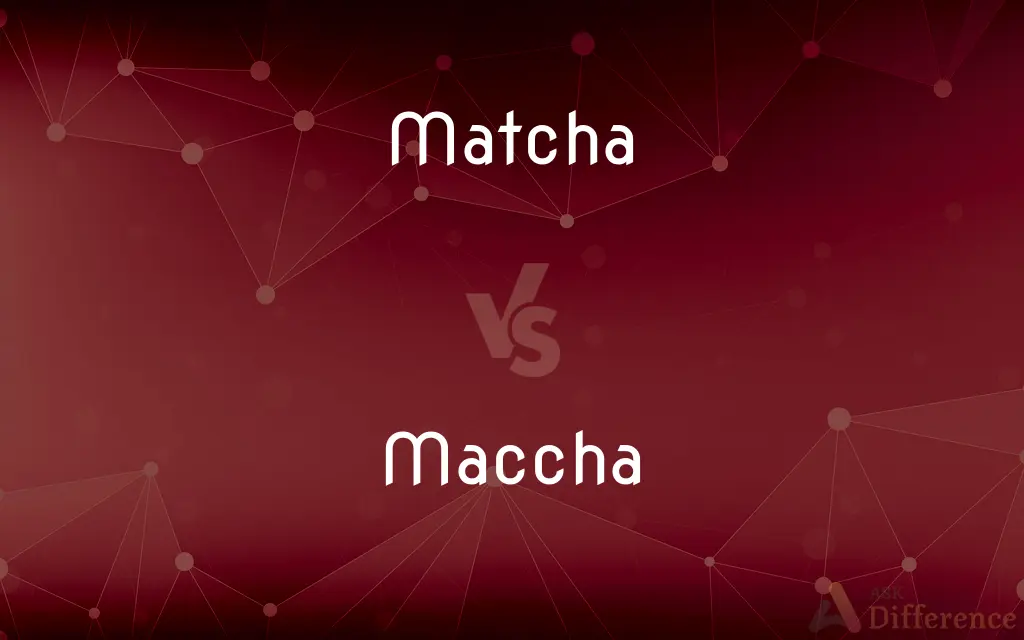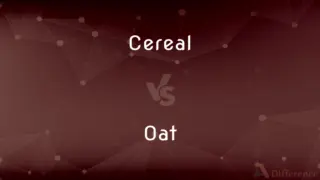Matcha vs. Maccha — What's the Difference?
By Tayyaba Rehman & Urooj Arif — Updated on April 26, 2024
Matcha and maccha refer to the same product, a finely ground powder of specially grown and processed green tea leaves, differing only in romanization.

Difference Between Matcha and Maccha
Table of Contents
ADVERTISEMENT
Key Differences
Matcha is a traditional Japanese green tea powder known for its vibrant green color and rich, umami flavor. Whereas, maccha is simply an alternative romanization of the word "matcha," reflecting a different transcription style from Japanese.
The preparation of matcha involves shading tea plants before harvesting to increase chlorophyll levels, which enhances the green color and flavor. On the other hand, maccha, despite the different spelling, undergoes the same cultivation and processing techniques.
Matcha is commonly used in the Japanese tea ceremony, a cultural practice that emphasizes mindfulness and respect. Whereas, maccha, though spelled differently, is used in the exact same ceremonial contexts.
In culinary applications, matcha is added to lattes, desserts, and smoothies for its flavor and health benefits, like antioxidants. Similarly, maccha can also be used in these ways, with no difference in application due to the alternate spelling.
The spelling matcha is more widely recognized globally and often used in international marketing of Japanese tea products. Whereas, maccha might appear in more traditional or culturally specific contexts, though its usage is less common.
ADVERTISEMENT
Comparison Chart
Spelling
Matcha
Maccha
Pronunciation
'MAH-tch-ah'
'MAH-tch-ah'
Origin
Japanese tea
Japanese tea
Usage in Ceremonies
Commonly used
Commonly used
Global Recognition
More recognized
Less recognized
Compare with Definitions
Matcha
Used in traditional Japanese tea ceremonies.
During the ceremony, matcha is whisked with hot water.
Maccha
Identical to matcha, a green tea powder.
Maccha is just another spelling for matcha.
Matcha
Added to foods for flavor and color.
Matcha adds a unique taste to ice cream.
Maccha
Involved in the same tea ceremonies as matcha.
Maccha is used traditionally in Japanese tea rituals.
Matcha
Associated with a calming effect due to L-theanine.
Matcha is preferred by some for its relaxing properties.
Maccha
Provides the same health benefits as matcha.
Maccha is consumed for health much like matcha.
Matcha
A fine powder made from green tea leaves.
Matcha is celebrated for its health benefits.
Maccha
Equally rich in chlorophyll and nutrients.
Maccha is valued for its nutritional content.
Matcha
Known for its high antioxidant content.
Matcha is often consumed for its antioxidants.
Maccha
Used similarly in culinary contexts.
Maccha can also be found in recipes for cakes and lattes.
Matcha
Matcha (抹茶, English: ; Japanese: [mattɕa]; Mandarin: [mwǒ.ʈʂʰá]) is finely ground powder of specially grown and processed green tea leaves, traditionally consumed in East Asia. The green tea plants used for matcha are shade-grown for three to four weeks before harvest; the stems and veins are removed during processing.
Maccha
Nonstandard spelling of matcha
Matcha
Powdered green tea, used in Japanese tea ceremonies and as a flavoring for sweets and sweet drinks.
Matcha
Tea prepared by mixing such powder with hot water.
Matcha
A type of powdered green tea, traditionally used in Japanese tea ceremonies.
Common Curiosities
Are there any differences between matcha and maccha?
No, the terms refer to the same product, differing only in spelling.
What is matcha?
Matcha is a finely ground powder made from specially grown and processed green tea leaves.
Why are there two different spellings?
The different spellings reflect variations in the romanization of the Japanese word.
How should matcha or maccha be stored to maintain freshness?
Both should be stored in a cool, dark place in an airtight container to prevent exposure to light, air, and moisture, which can degrade the quality.
What are the health benefits of consuming matcha or maccha?
Both matcha and maccha are rich in antioxidants, which help combat free radicals and may reduce the risk of chronic diseases. They also contain L-theanine, which can promote relaxation and improve focus.
How is matcha used?
Matcha is used in tea ceremonies, as well as in various food and drink recipes.
What is maccha?
Maccha is an alternative spelling for matcha, referring to the same green tea powder.
How is matcha traditionally prepared in Japanese tea ceremonies?
In traditional Japanese tea ceremonies, matcha is sifted into a bowl, then hot water is added, and the mixture is whisked with a bamboo whisk until frothy.
Can maccha be used for health purposes like matcha?
Yes, since maccha and matcha are the same product, they both offer similar health benefits, including high levels of antioxidants and L-theanine.
Is maccha less popular than matcha?
Yes, the term "maccha" is less commonly used globally compared to "matcha," which is more widely recognized in international markets.
What is the cultural significance of matcha in Japan?
Matcha holds significant cultural importance in Japan, particularly in the context of the tea ceremony, which is a ritualized form of making and drinking tea, emphasizing mindfulness, respect, and purity.
What does matcha taste like compared to other teas?
Matcha has a unique flavor profile that is rich and earthy, with a distinct umami taste, compared to the more astringent or floral flavors of other green teas.
Share Your Discovery

Previous Comparison
Custom vs. Bespoke
Next Comparison
Cereal vs. OatAuthor Spotlight
Written by
Tayyaba RehmanTayyaba Rehman is a distinguished writer, currently serving as a primary contributor to askdifference.com. As a researcher in semantics and etymology, Tayyaba's passion for the complexity of languages and their distinctions has found a perfect home on the platform. Tayyaba delves into the intricacies of language, distinguishing between commonly confused words and phrases, thereby providing clarity for readers worldwide.
Co-written by
Urooj ArifUrooj is a skilled content writer at Ask Difference, known for her exceptional ability to simplify complex topics into engaging and informative content. With a passion for research and a flair for clear, concise writing, she consistently delivers articles that resonate with our diverse audience.
















































